- Home
- Robert Goddard
Out of the Sun Page 9
Out of the Sun Read online
Page 9
“I will be.”
The door slammed, the cab pulled away and Harry slid the photograph out of its envelope. David, tousle-haired in jeans and a skiing jacket, was pictured leaning against a dry-stone wall with some slab of Pennine scenery behind him, bathed in watery sunlight. It was, as Iris had implied, an unremarkable snapshot. But the event it had preceded by only a few days gave it a patina of un attainability a quality of longing as well as loss. And something else struck Harry at once. Something he knew must have made Iris wonder in the end whether she should hand it over after all. David was smiling. Broadly and affectionately. As a son would at his mother. Or his father.
FIFTEEN
Rain spat at the window of room E318. Beyond the glass lay a wet and windy London night. Harry stared glumly out at the refracted lights of the city red and white, green and amber -then turned back to the bed and looked down at David, his unmoving unknowing son, to whom all weathers were one, all changing moods and variations a single grey shapelessness. Did he dream? Harry wondered. Did his mind stray where his body could not? Was there really, was there truly, nothing to retrieve?
“I’ll be off soon,” said Harry, slumping down into the bedside chair. “Got to be at Victoria by ten. Think of me, bucketing across the Channel, while you’re tucked up here, all snug and warm. It’s my own fault, of course. If I’d taken up your mother’s offer, I could probably have flown to Copenhagen in about an hour and a half. Instead of which, it’ll be this time tomorrow night before I arrive. Assuming the ferry makes it to Ostend, of course. In this weather, you can’t take that for granted. Still, I once came back to London from Athens by train and that took two and a half days, so twenty-two hours to Copenhagen shouldn’t kill me, should it? Of course, I was younger then. Well, a bit younger. Lately, I’ve been getting too set in my ways. Perhaps this trip will do me good.
“But I’ll have to watch the pennies. Or the kroner. I won’t have a job to come back to, you see. Crowther turned down my request for time off. Said it wasn’t “convenient”. Said if I insisted on going he’d “look on it as a resignation”. Well, I insisted. So apparently I’ve resigned. Can’t say I’m sorry. I’ll miss old Shafiq, but that’s about it. I think he’ll miss me too. We went for a farewell drink, but it wasn’t an uproarious send-off, not with Shafiq sticking to orange juice and muttering about the gloomy employment prospects for a man of my age.
“We’ll have to see about that, won’t we? First I have to find your friend Torben Hammelgaard. Maybe Donna Trangam as well. Your mother doesn’t think she can help you, but I’m not so sure. She might be staying away because she’s afraid for her life. After what happened to Kersey, Mermillod and you, you couldn’t blame her. Not that I know exactly what happened. To them or to you. I went out to the Skyway Hotel, you know. Your mother gave me the room number. I talked the management into letting me take a look inside. Drew a blank, of course. There weren’t any notebooks strapped to the bottom of the bed or wedged behind the cistern. I checked. If I say so myself, I was pretty thorough. And there was definitely nothing. But they were there, weren’t they? They were there with you.
“What’s in them, David? What makes them so important? If they are important. If they’re not just a red herring. I mean, higher dimensions? Who the hell understands them, let alone cares about them? I tried Dr. Tilson’s book, but I couldn’t get past the first page. I had to borrow Mrs. T’s dictionary just to work out what the title meant. Topology is the mathematics of abstract spaces, right, which can change size or shape while still remaining the same? So implicate topology is about abstract spaces wrapped around each other, twisted together somehow. And complex numbers are numbers that can’t be mathematically defined, like the square root of minus one. So Dr. Tilson’s book is about tangled-up abstract spaces created with numbers that don’t exist. Well, hell’s teeth, what does any of that actually meanT
Harry sighed and leant forward, resting his elbow on his knee and his chin on his palm. “My guess is higher dimensions don’t come into this. They weren’t what you were working on at Globescope, were they? Dr. Tilson told me about Project Sybil. The future. That’s what it’s all about, isn’t it? The new millennium and what it holds. Something you realized. Something you discovered. Something you foresaw. That could be in the notebooks too, buried in the hyper-dimensional hocus-pocus. Two dead. Two in hiding. And you. How many others? Two? Three? Four? You know, don’t you? But you’re not going to tell me. They must all know what it is. That’s why they’re all in danger.
“Your mother’s given me a snapshot of you. You don’t mind,
do you? It’s only a copy. It’s the last picture she took of you, when you went to Edale with her a few days before … You used to go there a lot, so she tells me. When you were younger. You and her and… Claude, of course. So many happy family outings. You didn’t know about me then. She hadn’t told you. But even when she did, you didn’t come looking for me, did you? Why not? You could have found me easily enough. My mother… your grandmother … could have given you my address in Rhodes. You could have come out for a holiday. Or written me a letter. But you never did. Thought there was no point, I suppose. Thought there was nothing to be gained. I can understand that. Well, now’s my chance to prove you wrong, isn’t it? Now’s my once-in-a-lifetime opportunity.
“It doesn’t feel much like it, though. It feels more like a fool’s errand. But I’ve run those before. And I haven’t always regretted it. So we’ll just have to see what comes of it, won’t we? We’ll just have to give it a go.”
Harry sat back and looked at his watch. “Nearly time I was off. I’d better make sure I catch that train, hadn’t I? I only hope there’s a buffet on board. A clear head isn’t what I need for a midnight sailing in a force ten gale. Think I’ll find Torben in Copenhagen? I reckon you’ve a fair idea of my chances. Well, perhaps it’s better if you don’t tell me. Odds generally depress me. Basically because they’re seldom in my favour. I suppose it’s been that kind of a life. Only child, like you. Never knew my father. He died when I was three, crushed under a locomotive wheel at the GWR works in Swindon. A bit like you again, I suppose. Except you thought you did know your father. Only to find out after he was dead that he was an impostor. An unwitting impostor, it’s true, but still not the real thing. Not the shabby inadequate genuine article.”
Harry reached out and patted David’s hand where it lay on the coverlet. “That’s me,” he said, smiling gently in something between affection and self-mockery. “Your last best only hope.” He rose, picked up his bag from beside the bed and moved to the door. “I’ll do what I can,” he said, stopping to look back. “However little, however much.” He smiled again. “It’s a promise.” Then he turned and walked out into the corridor.
SIXTEEN
Harry’s storm-tossed Channel crossing was but a distant memory when he stumbled out of the Hovedbanegarden in Copenhagen the following evening to confront a city every bit as damp as London and several degrees colder. Illuminated hotel signs lured him west, but he had reached the fringes of the red-light district before he spotted an establishment that looked on a par with his budget. Sandwiched between a Turkish grocery and a tattoo parlour, the Hotel Kong Knud clearly had no pretensions to grandeur, but its foyer struck Harry as decent enough to promise clean sheets while dowdy enough to guarantee a modest tariff.
It turned out to have a small bar as well, whose gloomy custodian recommended Tuborg’s special winter brew with the urgency of somebody who recognizes a good customer when he sees one. Too many bottles of Julebryg later, Harry headed for bed. A broken-backed mattress and noisy copulation in the adjoining room did precisely nothing to delay his descent into log-like slumber. When he woke next morning, stiff-limbed and dry-throated, he was nevertheless ready for action.
The Niels Bohr Institute was a huddle of anonymous-looking grey stone buildings a mile or so out of the city centre. Harry asked the taxi driver to drop him just beyond the entrance, but the fellow either
misunderstood or pretended to, because Harry found himself clambering out in the Institute’s forecourt amidst a flurry of flaxen-haired students steering their bicycles adroitly round him despite armfuls of files.
There was some sort of time-lock mechanism on the main door, but so many people were coming and going that Harry was able simply to stroll in. The fact that he was about three times older than most of them did not seem to make much difference. Whether they took him for a professor or a janitor was hard to tell.
He reached an ill-lit foyer with corridors off and a large notice board crammed with handwritten advertisements for cheap accommodation and cut-price textbooks. Through a sliding glass partition next to it, he could see into a post room where two figures were sifting lethargically through bin loads of parcels and padded envelopes. Encouraged by a fleeting smile on the face of one of them, Harry tapped at the glass.
“Kan jeg hjaelpe med no get
“Um… I’m looking for, era member of staff here. Torben Hammelgaard.”
“Undskyld?”
Torben Hammelgaard.”
The fellow shrugged and shook his head, “Jeg for star del ikkeS
“He used to teach here. Ham-mel-gaard.”
Another shrug. Then his colleague, the one who had smiled, intervened. “You are looking for Torben Hammelgaard?”
“Yes. I am.”
“He has gone. Four years. Five, maybe. To America. Where all the clever ones go.”
“I heard he’d come back.”
“No.”
“Not necessarily here, to work. But to Copenhagen.”
“I don’t think so.”
“Is there anybody he might have been in touch with? A friend, maybe?”
There was a sudden debate between the two men in Danish. Glum mutterings and frowning glances at Harry. He did not understand a word, but the suspicion began to form in his mind that they had been asked such questions before. Eventually, the debate resolved itself.
“Nobody has seen Torben Hammelgaard here, sir. We don’t know his friends.”
“Family, then?”
The fellow deliberated for a moment, then said: “He had a sister. A … blomsterhandler. Rowers, you understand? She gave me … en rabat… a good price.” He grimaced. “I sent flowers one time. Not any more.”
“Sorry? You mean… you sent flowers to Hammelgaard’s sister?”
“Nej, nej’ He grabbed what looked fat enough to be the yellow pages for the whole of Denmark, thumbed through the book, then turned it round to face Harry, his finger stabbing at a boxed advertisement. Where a flower-basket emblem next to a familiar name finally surmounted the language barrier. Hammelgaard’s sister was a florist. With a shop in Copenhagen.
It was an up-market establishment on Stroget, the pedestrianized spine of the city centre. The assistants were polite but unhelpful. Margrethe Hammelgaard was away from the shop. Harry was advised to try again about four o’clock.
He filled the time with a liquid lunch and a tramp round the harbour. Copenhagen at the onset of winter was a chill and cautious city, offering as little as it denied: skies, streets and marine horizons of unyielding grey. On his way back along Stroget, still killing time, he wandered into a bookshop and scoured the academic shelves for some scientific work by Torben Hammelgaard, brain-drained lion of the Niels Bohr Institute. To his surprise, he found not just one, but two. Higher maths leavened with Danish prose rendered them doubly incomprehensible, of course, but there was a dust-jacket photograph of the author to reward his efforts.
Torben Hammelgaard was a prematurely balding young man in an open-necked black shirt, earnest and unsmiling behind steel-rimmed glasses and a precisely delineated beard. Han er fodt i 1957, the biographical blurb began. So, he was four years older than David. And the photograph looked to be at least ten years out of date. K0benhavns Universitet. Niels Bohr Instituted So was the information. It led Harry nowhere.
The store-cum-office at the rear of Margrethe Hammelgaard’s shop just after four o’clock held more promise, however. The lady in question had returned. She was busy on the telephone when Harry was shown in. Slim, short-haired and snappily dressed, she looked and sounded like a highly efficient businesswoman. Too efficient to welcome rambling enquiries about her errant egg-head brother, Harry feared. But at least she spoke fluent English. That was some kind of a start.
The telephone call ended. She looked up at him enquiringly.
“My name’s Harry Barnett, Miss Hammelgaard. I … er … I’m looking for your brother.”
“My brother?”
Torben.”
“And you are?”
“Harry Barnett. You don’t know me. Nor does your brother. But… it’s important I find him.”
“Torben lives in America. Princeton University.” She looked at him a little as the pair in the post room had. “Copenhagen wasn’t big enough for him.”
Harry stepped closer and lowered his voice. “Miss Hammelgaard…”
“I can’t help you. Torben ‘
“Left Princeton about six weeks ago and hasn’t been back since.” He tried to sculpt a reassuring smile. “It’s all right. I know what’s going on. Some of it, anyway. I’m no kind of threat.”
“I don’t know what you’re talking about.”
“If he’s here, he must have been in touch with you.”
“Like I said, Torben ‘
“I’m David Venning’s father.” The name meant something to her. That was clear. “I’m trying to help my son. And I’m trying to help your brother as well. He’s in danger. You know that, don’t you?”
She studied him silently for several seconds, then said: “You introduced yourself, just a moment ago, as Harry Barnett. Not Yenning.”
“It’s a long story.”
“I don’t have the time for this, Mr. … Barnett.”
“Fine. You’re busy. I understand that. You’re busy and I’m in a hurry. Maybe Torben is too. If not, I reckon he should be.” Her frown was deepening towards impatience. He did not have long to make an impression. “Look, Miss Hammelgaard, if I was going to pretend to be David’s father, I’d call myself Yenning, wouldn’t I? That’s what an impostor would do. But I’m not an impostor.”
“What are you, then?”
“A father. Trying to understand what’s happened to his son. David’s in a coma, you know. Has been since ‘
“I know all about that,” she snapped irritably.
“Because Torben told you?”
She gave him a long hard stare. “I read about it.”
“It made the Danish papers? You surprise me.”
She looked away: a sign of weakness, of doubt as much as surrender. “What do you want, Mr. Barnett?”
“A message passed. To your brother.”
“What is the message?” The question came in a whisper, loud with unspoken admission.
“We need to talk. As soon as possible. Time’s running out for everybody. I’m staying at the Hotel Kong Knud on Istedgade. Have him come there tonight.”
“It doesn’t work like that, Mr. Barnett.”
“How does it work, then?”
“You’ll have to wait and see, won’t you?”
“How long?”
“A day or two, maybe.”
That’s too long.”
“Then don’t wait.” She turned to meet his gaze. “It’s your choice.”
Harry waited as he was bound to. The rest of that day and most of the next. While Copenhagen’s strange mixture of licence and austerity chewed at his nerves. And the irrational conviction grew that he was being watched, followed, tracked every step of the way. He mooched round the sex shops of Istedgade, trying to work out what the more exotic items on display were actually for. He sat in bars drinking Julebryg and staring at David’s photograph until he had memorized every detail of the boy’s expression. He experimented with Danish cigarettes to eke out his dwindling supply of Greek ones, while watching the comings and goings of the car ferries d
own at the harbour. And every now and again he would find himself glancing nervously over his shoulder. But never quite quickly enough. If there was something there beyond his own baseless fears, it was always too fast for him.
“Letter for you,” announced the misanthropic manager of the Kong Knud as Harry shambled into the foyer late on Thursday afternoon. He slid a crumpled brown envelope across the counter along with the key. Harry grabbed the letter and tore it open as he moved towards the lift. There was a tourist street-map of Copenhagen inside. He looked back at the manager. “Did you see who delivered this?”
“No. There was nobody on the desk when it arrived.” Hammel-gaard then. It had to be.
Harry unfolded the map. Kongens Nytorv, the square at the eastern end of Stroget, had been circled in red ink. And one word had been written in the margin, unmissably large. MIDNIGHT.
SEVENTEEN
It was cold. There was rain in the air. And a chill stirring of rigging against masts down in the harbour reach that ended at a wharf on one side of the square. The dregs of the opera crowd had dispersed from the Royal Theatre. The last diners had quit the street-front restaurant of the Hotel d’Angleterre. The traffic had dribbled away. Harry felt exposed and far more conspicuous than he really was, circling the darkened centre of Kongens Nytorv. He lit another cigarette one of his precious Karelia Sertika and held the match close to his watch to read the time. Midnight had come and gone. But there was no sign of Torben Hammelgaard.
Harry drew on the cigarette and mixed a sigh with the smoke as he breathed out. Despite a lengthy soak in a bar halfway along Stroget, he felt completely sober. At this hour of the night, it was a particularly disagreeable sensation. Not least because he had so little experience of it.
Suddenly he spun round, convinced there was somebody close behind him. But no. It was just his nerves playing up again. Damp cobbles and glimmering tram-lines curved away towards the harbour, yielding nothing to his gaze. A late and empty bus sped by in a rush of sound. He turned back. And was no longer alone.

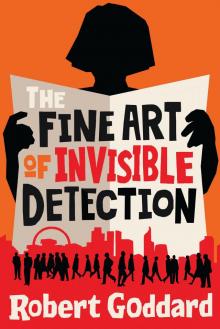 The Fine Art of Invisible Detection
The Fine Art of Invisible Detection One False Move
One False Move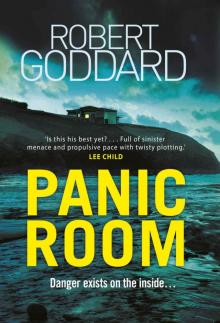 Panic Room
Panic Room Beyond Recall
Beyond Recall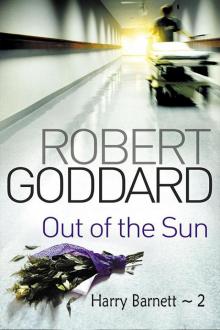 Out of the Sun
Out of the Sun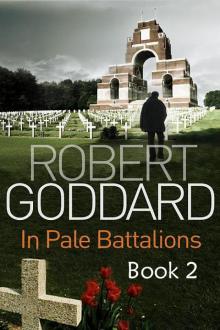 In Pale Battalions - Retail
In Pale Battalions - Retail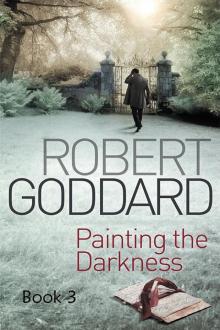 Painting The Darkness - Retail
Painting The Darkness - Retail The Corners of the Globe
The Corners of the Globe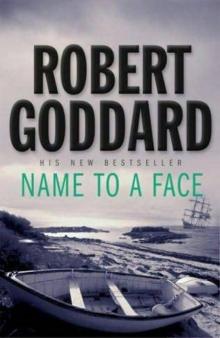 Name To a Face
Name To a Face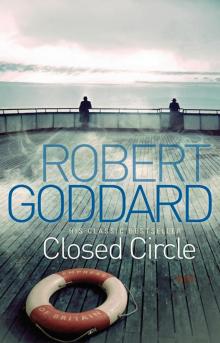 Closed Circle
Closed Circle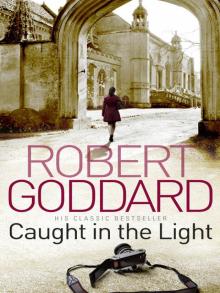 Caught In the Light
Caught In the Light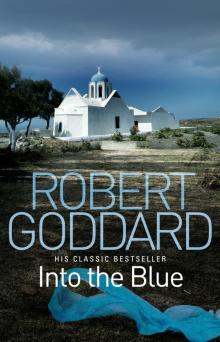 Into the Blue
Into the Blue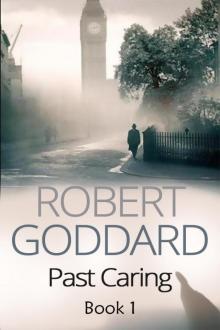 Past Caring - Retail
Past Caring - Retail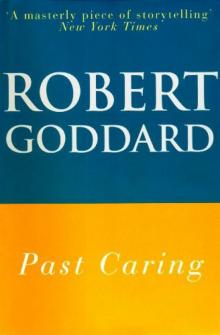 Past Caring
Past Caring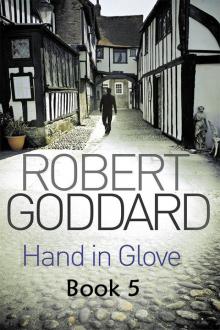 Hand In Glove - Retail
Hand In Glove - Retail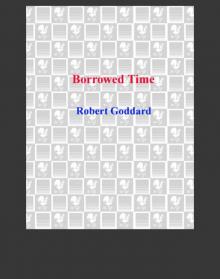 Borrowed Time
Borrowed Time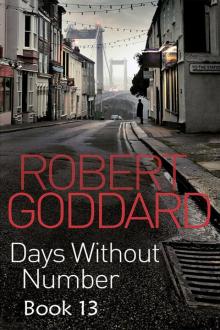 Days Without Number
Days Without Number James Maxted 03 The Ends of the Earth
James Maxted 03 The Ends of the Earth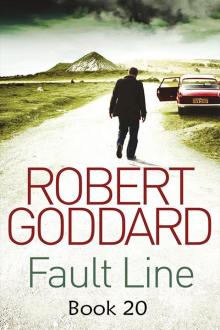 Fault Line - Retail
Fault Line - Retail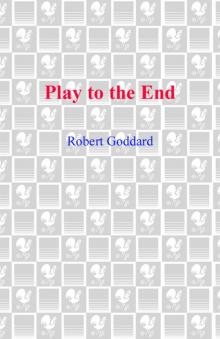 Play to the End
Play to the End Sea Change
Sea Change Never Go Back
Never Go Back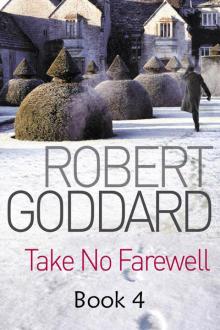 Take No Farewell - Retail
Take No Farewell - Retail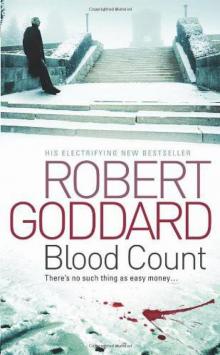 Blood Count
Blood Count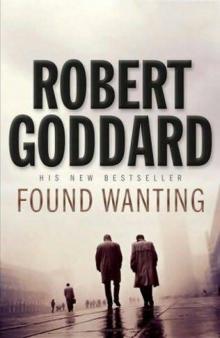 Found Wanting
Found Wanting Sight Unseen
Sight Unseen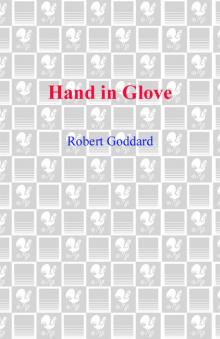 Hand in Glove
Hand in Glove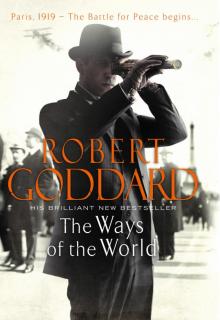 The Ways of the World
The Ways of the World